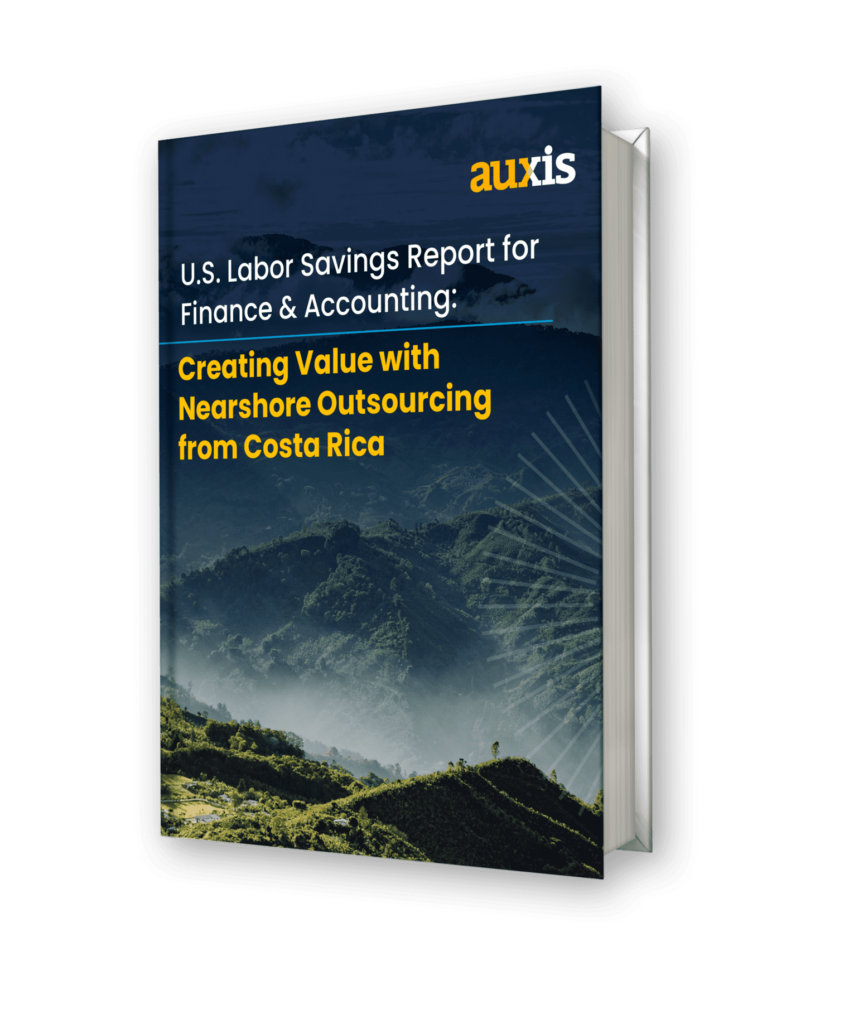Migrating accounting and finance processes delivers a competitive edge in today’s business environment
The stability and success of a company rests on proper management of its finances. From closing the books to applying cash to processing invoices, finance and accounting operations are integral to keeping organizations running and painting an accurate picture of their financial health.
But more and more CFOs and Finance Executives are realizing that performing this every day, transactional work in-house not only adds little value, but is expensive, inefficient, and cumbersome. It drains most of a finance team’s time and energy and prevents them from focusing on the high-value work that CEOs demand.
It’s no surprise that companies in a recent KPMG study said they now manage 83% of their finance and accounting functions under a shared services or outsourcing model – and nearly 60% plan to increase their reliance on BPO.
Here are five reasons why to outsource your finance and accounting department
1. CFO’s can focus on value-creating activities.
The modern finance team is a competitive differentiator for a business. Progressive CFOs and Finance Executives at companies of all sizes are sharpening their team’s focus on high-value activities that deliver stronger analytics and insights for proactive decision support.
But standing in the way of this transformation are the non-value added transactional tasks that consume most of a Finance Department’s energy. More than 75%of a typical finance team’s time is bogged down by the kind of work that “keeps the lights on:” chasing down invoices, reconciling accounts, and scrambling to put fires out left and right.
Outsourcing these repetitive and redundant tasks gives finance teams the time and energy they need to focus on core business growth activities.
2. Better access to specialized talent.
Being a hiring manager in today’s market is no easy task. The unemployment level of 3.9% is the lowest it has been in 50 years – and in the finance world, those numbers plummet all the way down to 6% for accountants and 2.1% for accounting and auditing clerks.
Thus, finding and retaining skilled professionals is a major hurdle for CFOs. A recent Robert Half report found that more than 90% struggle to find qualified staff to fill jobs – forcing them to significantly overpay for work that adds little value to the company.
Nearshore outsourcing solves these problems by providing skilled, reliable resources who see transactional tasks as high-end work and take pride in reaching the highest of performance levels.
They also drive productivity efficiencies that can be hard to achieve in Finance Departments performing the same tasks in the same ways for years. In San Jose, Costa Rica, for instance, consistently ranked as the leading nearshore outsourcing city in Latin America, outsourced workers bring fresh ideas gleaned from diverse experience performing this work for the more than 350 multinational companies already in the country.
3. Modernizing your back office drives efficiencies.
Inefficiencies in accounting systems are more than a time drain – they impact overall customer satisfaction. Transactional work may not boost value, but it keeps the business running and it must be done well.
Outsourcing transforms outdated, clunky operations into modern systems that serve as agile, strategic, and innovative partners for a business. It offers economies of scale and instant access to best practices and tools like Robotics Process Automation (RPA) that make Finance Departments more efficient. You can view an interesting report here: Where are we with RPA
It also delivers substantial cost savings that make room in your budget for investing in technologies and processes in other areas that can further enhance business performance. As just one example, publicly-traded retailer TigerDirect realized cost savings of 60 percent after outsourcing enabled it to modernize its finance operations.
Outsourcing paves the way for a holistic transformation of a Finance Department’s operating model. Once the back office burden is lifted, your internal team is free to embrace the modern mindset of a Finance Department that’s evolved beyond number crunching into value-creating activities.
4. A unique opportunity to wipe an inefficient slate clean.
Way too often, existing back office operations can’t see past the status quo. Workers are stuck in the way things have always been done, and the culture is stagnant and resistant to change.
At the same time, decentralized operations have caused many organizations to become too top heavy over the years, duplicating jobs at different locations and promoting people to managerial roles simply because they worked at the business a long time.
Outsourcing gives companies a unique opportunity to realign their span of control with industry best practices. By centralizing operations with an outsourcing provider, CFOs can relevel their organizations to the proper ratio of managerial vs. non-managerial roles – achieving significant cost and operational efficiencies. It’s a unique chance to strategically build an operating model from the ground up that’s most effective for delivering the work that needs to be done, instead of struggling to restructure one that’s become bloated and inefficient over time.
Outsourcing also gives finance leaders a chance to disrupt their traditional business processes. Leveraging the provider’s expertise in automation, process improvements, and overall best practices offers a significant opportunity for cost savings. Unfortunately, those same changes typically meet resistance in-house from employees concerned about downgraded status or stepping out of their comfort zones.
5. A Cost-effective bottom line.
Cost savings is one of the biggest and most tangible benefits of outsourcing. At the end of the day, outsourcing enables your business to receive quality work at a much lower price.
Labor costs top the savings opportunities. In the U.S., CFOs are overpaying for employees who often don’t perform transactional tasks to the highest levels and are constantly looking for better opportunities. Auxis research found that outsourcing finance and accounting positions from New York to Costa Rica, for instance, cuts labor costs by an average of 42 to 51 percent.
That’s a savings of $44,000 to $63,000 per head. Think about the number of employees performing this low-value work in your Finance Department, and you start to see the significant boost outsourcing can provide to your bottom line.
Another significant source of savings is realized through achieving the productivity efficiencies and more efficient, centralized operations previously discussed. Just the implementation of RPA can generate time and money savings of 40 percent in the areas it’s automating.
Savings derived from economies of scale and productivity gains typically average between 10 to 20 percent. But those numbers can easily climb depending upon how much room for improvement and automation there was before the business was outsourced.
Benefits of accounting outsourcing that helps you compete in a global market
There’s no disputing that cost-cutting plays a key role in the decision to outsource, but for many companies, it’s not the leading factor. A unique ability to address the challenges of the current structure and drive operational efficiencies goes a long way toward convincing an executive team to buy into this game-changing strategy.
Outsourcing is a favorite strategy of Fortune 500 companies, who often operate their own shared service centers to streamline operations and enable their team members to zero in on their primary strengths. But in recent years, there’s been rising interest from middle-market companies (ranging in revenue from $200M to $2B) that realize outsourcing non-value added operations gives them an edge in today’s fiercely competitive, global business environment by freeing up the time and financial resources they need to focus on their core competencies.
But few companies outside the Fortune 500 have the resources to establish their own shared service centers. Partnering with an experienced outsourcing provider helps middle market companies reap the cost and process efficiencies that outsourcing delivers without the financial burden or headache of opening their own facility. The best providers also offer access to a pool of workers with the highest skills and expertise that could be difficult for mid-sized companies to tap into on their own.
Outsourcing back office operations frees up finance teams to direct their attention to the value-creating activities that drive growth. An experienced outsourcing provider can help you uncover the opportunities within your finance organization that significantly cut costs and help transform your department into a strategic partner for the business.


